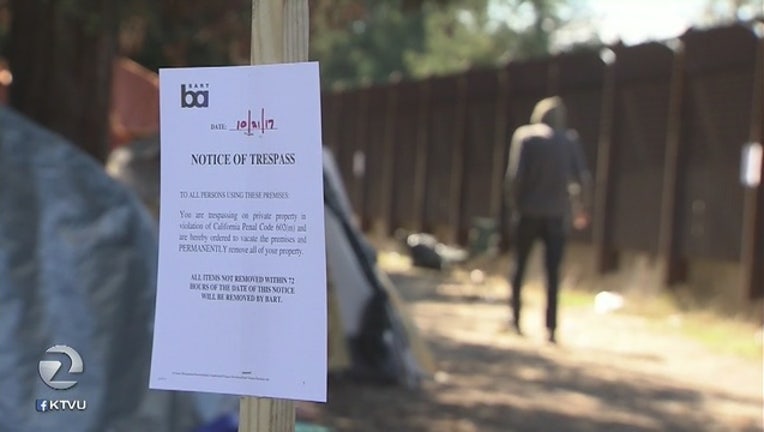Judge orders Berkeley to submit plan for sheltering all homeless residents

SAN FRANCISCO (BCN) In a follow-up to a ruling on a homeless encampment on Tuesday, a federal judge in San Francisco today ordered the city of Berkeley to come up with "a plan to shelter substantially all of Berkeley's homeless" during the coming winter.
U.S. District Judge William Alsup told the city, "Do not simply recite the programs the city purports to offer, for they are admittedly insufficient."
But Alsup also said in his one-page directive that he is not ordering the city to carry out the requested plan.
Instead, he said, he wants to be informed about "the scope of possible relief" that might be granted to members of a homeless encampment next to BART tracks in South Berkeley who sued to try to block their eviction.
In a ruling on Tuesday, Alsup declined to issue a preliminary injunction halting BART's proposed eviction of the 20 to 30 residents of a camp sometimes known as "Here/There."
He said that BART, which owns the land, was not equipped to manage housing and was entitled to enforce trespassing laws. He said the transit agency could evict the occupants after posting a 72-hour notice and promising to store their property for at least two weeks.
But Alsup also said the five residents who sued BART and the city could proceed to a full trial early next year and that both sides could begin gathering evidence.
The information about whether and how Berkeley could come up with a plan to shelter almost all homeless residents would be used in future proceedings. In a court filing last week, Berkeley's lawyers said there were nearly 1,000 homeless people in the city as of the last count in January.
Alsup also instructed the plaintiffs' lead attorney, Dan Siegel of Oakland, to come up with his own proposal for sheltering the homeless.
"Be specific. Name the soccer fields and open spaces he would convert to tent cities," the judge ordered.
The judge concluded, "Failure to be specific may be a sign there is no practical solution."
He ordered the two sides to submit their plans by Nov. 28.
During a hearing before Alsup Tuesday on the unsuccessful preliminary injunction request, Siegel said he believed there are unused spaces available in the city and gave soccer fields as an example.
Siegel was not in his office today, but fellow attorney EmilyRose Johns said Siegel rhetorically mentioned soccer fields "to make a point" and said the plaintiffs' attorneys expect to suggest using abandoned or underused lots for homeless camps.
"I don't think anyone wants to deprive people of green spaces,"
Johns said.
Johns said homeless advocates believe they have a good model for a supported encampment, which includes having "a strict set of rules" such as the Here/There camp's ban on alcohol, hard drugs and violence.
Alsup also on Tuesday ordered the two sides to engage in "prompt mediation" under the supervision of U.S. Magistrate Donna Ryu of Oakland.
City of Berkeley spokesman Matthai Chakko said, "We are reviewing all our options."
Chakko added, "Helping our homeless population get housed has been and continues to be a priority. We devote significant resources to help address, on a local level, what is a regional, statewide and national issue."

